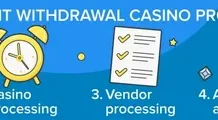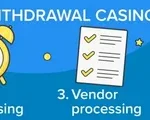In the world of online slots, the term “RTP” (Return to Player) is paramount. It represents the theoretical percentage of all wagered money that a slot machine will pay back to players over time. A higher RTP generally indicates better long-term returns, leading players to seek out “loose slots” – those with a higher RTP. While regulated markets often impose minimum RTPs or have specific ranges, a distinct advantage can sometimes be found at “non-GamStop casinos” for UK players. These platforms occasionally offer a “High RTP Club,” featuring slots with more generous payout percentages, appealing to British players who prioritize better theoretical returns. This article delves into the concept of high RTP slots at UK casino not on GamStop, the reasons behind their potential for looser payouts, and the crucial considerations for British players looking to join this exclusive club.
Understanding RTP and “Loose Slots” for UK Players
RTP is expressed as a percentage; for example, a slot with a 96% RTP is expected to pay back £96 for every £100 wagered over an extended period. It’s a theoretical figure and doesn’t guarantee individual session outcomes, but it’s a key indicator of a game’s fairness and payout potential. “Loose slots” is a colloquial term for games with a higher RTP, implying they pay out more frequently or in larger sums over time.
In the UK Gambling Commission (UKGC)-regulated market, game providers must adhere to strict licensing requirements, which often include specific RTP ranges or minimums. This can sometimes lead to a more standardized RTP across different casinos offering the same game. However, non-GamStop casinos, operating under licenses from jurisdictions like Curaçao or Malta, often have more flexibility. This regulatory difference can allow them to:
- Offer Different RTP Versions: Some game providers develop multiple RTP versions of the same slot. Non-GamStop casinos might choose to offer the higher RTP version to attract players.
- Feature Games from Diverse Developers: They can partner with a wider array of software providers, including those whose games inherently have higher RTPs or who operate in jurisdictions that allow for more generous settings.
- Compete on Payouts: Offering higher RTPs can be a strategic move to attract British players, especially those who are savvy about slot mechanics and seek the best theoretical value.
Why Non-GamStop Casinos Might Offer Higher RTP to UK Players
The potential for a “High RTP Club” at non-GamStop casinos stems primarily from the less restrictive regulatory environment they operate within:
- No Mandatory Minimum RTPs: Unlike some highly regulated markets, certain offshore licenses might not impose strict minimum RTP percentages, giving casinos and providers more freedom to set higher payouts.
- Competitive Edge: In a less regulated and often more crowded market, offering higher RTPs can be a powerful differentiator to attract and retain British players who are actively seeking better value for their money.
- Flexibility in Game Configuration: Game developers often create different RTP settings for their slots. A non-GamStop casino might have the autonomy to select the higher RTP configuration for their platform, directly benefiting UK players.
- Focus on Player Retention: By providing a better theoretical return, these casinos aim to keep players engaged and loyal, understanding that a perception of fairness and better payouts is key to long-term player relationships.
Finding Your Way into the High RTP Club for UK Players
For British players interested in finding these “loose slots” at non-GamStop casinos, due diligence is essential:
- Check In-Game Information: Reputable game providers will usually display the RTP within the game’s information or paytable. Always verify this before playing.
- Consult Independent Review Sites: Many casino review sites specialize in non-GamStop casinos and often highlight platforms known for offering higher RTP games, specifically catering to UK players’ interests.
- Look for Specific Providers: Research game developers known for generally higher RTP slots (e.g., NetEnt, Play’n GO, Quickspin often have high RTP titles), and then find non-GamStop casinos that host their games.
- Read Casino Terms: While less common, some casinos might list general RTP information or their policy on game versions in their terms and conditions.
Crucial Considerations for UK Players
While the allure of higher RTP is strong, British players must approach non-GamStop casinos with extreme caution:
- Reduced Player Protection: The most critical risk. Casinos with less stringent oversight may not offer the same level of consumer protection, dispute resolution, or responsible gambling tools as UKGC-licensed sites.
- Casino Legitimacy: A high RTP doesn’t guarantee a trustworthy casino. Always research the casino’s licensing (e.g., Curaçao, Malta), overall reputation, and player reviews to ensure it’s legitimate and pays out winnings reliably. Look for a verifiable license from a reputable international jurisdiction.
-
Responsible Gambling: For individuals on GamStop, accessing these sites directly undermines their self-exclusion. Even with higher RTP, gambling remains a form of entertainment with inherent risks. It is paramount to exercise extreme personal discipline and utilize any self-limitation tools the non-GamStop casino might offer.
- Other Terms and Conditions: High RTP might be offset by less favorable bonus terms (e.g., high wagering requirements) or restrictive withdrawal limits. Always read the fine print.
Conclusion: Value with Added Responsibility for UK Players
The “High RTP Club” at non-GamStop casinos offers a compelling proposition for British slot enthusiasts seeking better theoretical returns and “looser” games. The flexibility in regulatory environments allows these platforms to potentially provide a more player-friendly RTP landscape. However, this pursuit of higher value comes with a critical trade-off: reduced player protection and a greater onus on the individual to manage their gambling responsibly. For UK players venturing into this less regulated territory, the thrill of potentially better payouts must be balanced with meticulous due diligence and an unwavering commitment to personal limits, ensuring that the pursuit of a high RTP doesn’t lead to unforeseen pitfalls.









